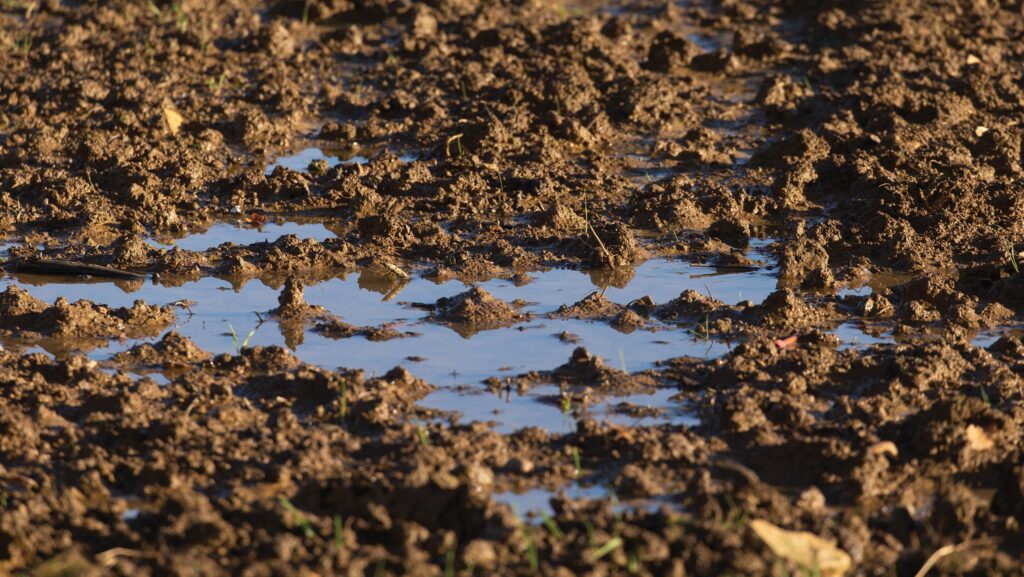‘Biblical’ rainfall washes away newly drilled crops
 ©Tim Scrivener
©Tim Scrivener Rainfall in volumes described as “biblical’’ by one arable farmer has washed away freshly planted crops and flooded grain stores in many UK regions, with farms in England among the worst affected by the weekend deluge.
After a week of near-perfect conditions for drilling, the volume and intensity of the weekend rain was disastrous for many growers.
Andrew Robinson, who farms 1,200ha in the Toddington area of Bedfordshire, planted one-third of that land with wheat and barley last week, but after 103-143mm of rainfall on Sunday (22 September), he expects it to fail.
See also: Partnership launched to build flood resilience on farms
Mr Robinson described it as the worst day in the many years he has been farming.
“I have been fortunate to travel across the world to many countries, but I never seen anything like it, it was biblical,” he said.
“I’m not sure where this leaves us going forward.”
The volume that fell in such a short period was completely unexpected.
“We pulled up the stumps on Friday lunchtime and called it a day because there was a weather warning that we might get 50mm, but certainly not this much.
“We have heavy land that doesn’t dry out well, so I don’t know how much more drilling we will get done.”
The rain also entered Mr Robinson’s grain stores, despite a programme of drain clearance pre-harvest, though he hopes these losses are covered by insurance.
Washout
The situation was also bad in Herefordshire, where, despite the possibility that he might lose 40ha of newly planted winter wheat, Adam Lewis counts himself among the more fortunate, having finished his harvest last week.
“We were on the northern edge of the deluge on Friday,” he said.
“We had 11mm, but 10 miles away they had 80mm,” says Mr Lewis, of Hampton Wafre Farm, Docklow, near Leominster.
His rain gauge showed the intensity of the rain that fell on Friday night as 93mm/hour.
Mr Lewis says he now wishes he had committed land to Sustainable Farming Incentive (SFI) options.
“Farming is becoming a high-risk game and it is very difficult to balance risk versus reward,” he said.
Fellow Herefordshire farmer Billy Lewis, who helps run the mixed Boycefield Farm at Dilwyn in west Hereford, took to social media platform X to share his story.
With 40mm of rain falling in just one hour, he was left counting the cost of a flooded feed shed and newly planted grass seed that was washed away.
That’s what 40mm of rain in an hour will do. Feed shed flooded, grass seeds planted last week on the most part ruined, countless other things washed away. Government needs to wake up and smell the coffee, the incentive isn’t there for producing food at the moment. pic.twitter.com/lndT209HKV
— Boycefield Herefords (@BoycefieldFarm) September 21, 2024
Benefits
Some growers, however, benefited from the moisture over the weekend, including sugar beet growers in the east of England.
Lincolnshire farmer Andrew Ward thought he would have to delay harvesting this week as even on his heavier land the ground conditions were too dry.
“We have the harvester lined up for this week because the Newark factory opens, but thought we were going to have to cancel it because there was a risk that the roots, where a lot of the sugar is, would snap off,” he said.
“But we had 26mm over two days, so it is absolutely perfect for lifting sugar beet.”
Scotland
Many regions of Scotland were also spared the worst of the rain after what has been a very challenging harvest.
James Telfer was snatching the last of his late May-drilled barley under “heavy east-coast skies” on Monday (23 September).
He said it was a relief to get the crop cut, even though, at 6.5t/ha, yields are down because of the very late planting.
